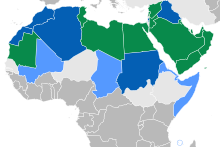| Arabic | |
|---|---|
| العربية, al-ʻaarabiyyah | |
 | |
| Pronunciation | /al ʕarabijja/, /ʕarabiː/ |
Standard forms | |
| Dialects |
|
| Arabic alphabet Arabic Braille Syriac alphabet (Garshuni) Hebrew alphabet (Judaeo-Arabic) | |
| Official status | |
Official language in | Standard Arabic is an official language of 27 states, the third most after English and French[1] |
| Language codes | |
| ISO 639-1 | Arabic |
| ISO 639-2 | Arabic |
| ISO 639-3 | Arabic Arabic (generic) |
 Use of Arabic as the sole official language (green) and an official language (blue) | |
Arabic (العربية, al-ʿarabiyyah) is a Semitic language, like Hebrew and Aramaic that first appeared in the mid-ninth century BCE in Northern Arabia and Sahara southern Levant.[2][3] Unlike the latter two, where the former derives from the other, however, Arabic is itself a root language, like Latin. Unlike Latin, it is still widely used and spoken today. Around 292 million people speak it as their first language. Many more people can also understand it as a second language in the Maghreb. The Arabic language is written from right to left in a consonant alphabet, which is also called an abjad.[4] Since it is so widely spoken throughout the world, the language is one of the six official languages of the United Nations. The other official languages of the UN are: English, French, Spanish, Russian and Chinese.[5]
Many countries speak Arabic as an official language, but not all of them speak it the same way. The language has many dialects, or varieties, such as Modern Standard Arabic, Egyptian Arabic, Gulf Arabic, Maghrebi Arabic , Levantine Arabic and many others. Some of the dialects are spoken so differently from one another that some speakers have a hard time understanding the other. Many dialectic words however are nonetheless still rooted in the original, or classical language.
Most of the countries that use Arabic as their official language are in the Middle East. They are part of the Arab World, the largest religion in the region is Islam.
Arabic is very important in Islam because Muslims believe that Allah (God) used it to talk to Muhammad through the Archangel Gabriel (Jibril), giving him the Quran in the language. Many but not all Arabic-speakers are Muslims. The miracle of the Quran is believed to be in its language.
Arabic is also becoming a popular language to learn in the Western world even though its grammar is sometimes very hard to learn for native speakers of Indo-European languages. Many other languages have borrowed words from Arabic because of its importance in history. Some English words that can be traced to Arabic are sugar,[6] cotton,[7] magazine,[8] algebra,[9] alcohol[10] and emir.[11][12][13]
Arabic is an official language of these countries:
- Algeria
- Bahrain
- Comoros
- Chad
- Djibouti
- Egypt
- Eritrea
- Iraq
- Israel
- Jordan
- Kuwait
- Lebanon
- Libya
- Mauritania
- Morocco
- Oman
- Pakistan
- Palestine
- Qatar
- Saudi Arabia
- Somaliland
- Sudan
- Syria
- Tunisia
- United Arab Emirates
- Yemen
It is also a national language of:
Alphabet
The Arabic alphabet is a consonant alphabet with 28 letters, as listed below:
- ا (alif, pronounced a)
- ب (ba, pronounced like the English letter ‘b’)
- ت (ta, pronounced similar to the English letter ‘t’)
- ث (tha, pronounced like the ‘th’ in ‘bath’)
- ج (jeem, pronounced like ‘j’)
- ح (haa, pronounced like a heavy ‘h’ from the neck)
- خ (khaa, pronounced like a retch or a snort from the throat)
- د (dal, pronounced like ‘d’)
- ذ (thal, pronounced like the ‘th’ in ‘the’)
- ر (ra’, pronounced like ‘r’ in Italian)
- ز (zay, pronounced like ‘z’ in zebra)
- س (seen, pronounced like a hiss)
- ش (sheen, pronounced like ‘shh’)
- ص (saud, pronounced like the seen but slightly heavier)
- ض (dah, pronounced like dal but heavier)
- ط (tah, pronounced like a pressured ‘t’)
- ظ (tha, pronounced by pulling the midsection of your tongue down while trying to say a heavy ‘th’)
- ع (‘ain, pronounced similar to a gagging sound)
- غ (gha, pronounced like gargling water)
- ف (fa, pronounced like ‘f’)
- ق (qaf, like the sound made in comical cartoons when the characters gulp down a drink)
- ك (kaf, pronounced like ‘k’)
- ل (lam, pronounced like ‘L’)
- م (meem, pronounced like ‘m’)
- ن (noon, pronounced like ‘n’)
- ه (ha, soft ‘h’ sound)
- و (waw, pronounced like ‘w’ or ‘ooh’)
- ي (ya, pronounced like ‘y’)
References
- ↑ Wright, 2001, p. 492.
- ↑ Al-Jallad, Ahmad. "Al-Jallad. 2018. The earliest stages of Arabic and its linguistic classification".
((cite journal)): Cite journal requires|journal=(help) - ↑ Al-Jallad, Ahmad. "Al-Jallad. A Manual of the Historical Grammar of Arabic".
((cite journal)): Cite journal requires|journal=(help) - ↑ "Abjads / Consonant alphabets". omniglot.com. Retrieved 2022-04-14.
- ↑ Nations, United. "Official Languages". United Nations. Retrieved 2022-04-14.
- ↑ "sugar, n." Oxford University Press – via Oxford English Dictionary.
- ↑ "cotton, n.1". Oxford University Press – via Oxford English Dictionary.
- ↑ "magazine, n." Oxford University Press – via Oxford English Dictionary.
- ↑ "algebra, n." Oxford University Press – via Oxford English Dictionary.
- ↑ "alcohol, n." Oxford University Press – via Oxford English Dictionary.
- ↑ "emir - Search Online Etymology Dictionary". www.etymonline.com.
- ↑ "emir - Definition of emir in US English by Oxford Dictionaries". Oxford Dictionaries - English. Archived from the original on 2019-03-26. Retrieved 2019-01-20.
- ↑ "Definition of EMIR". www.merriam-webster.com.